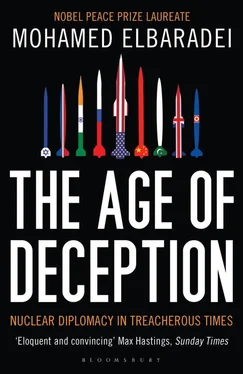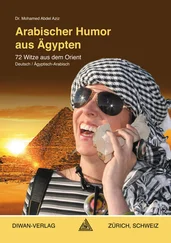And so, after four years of the Agency’s absence, the door to Iraq inspections was reopened.
For the IAEA, the starting point for reentering Iraq was our December 1998 baseline: our existing store of knowledge of Iraq’s past nuclear capabilities and facilities. Any fuel cycle or weapons-related facilities from the early 1990s had been completely dismantled; all weapons-usable material had been removed as early as February 1994; what remained was low-grade nuclear material and certain dual-use facilities and materials—and, of course, the knowledge of certain nuclear processes: no inspection program can erase knowledge already learned. At the time of the first Gulf War, Saddam Hussein’s nuclear scientists had still been some distance away from constructing a nuclear weapon, but they had achieved laboratory-scale mastery of some uranium enrichment processes and weaponization techniques.
The task before us was to determine what had changed and what nuclear activities, if any, had been revived during the intervening four years. To arrive at an answer, we would rely on inspections of known facilities, visits to new sites, the restart of surveillance systems, extensive environmental monitoring, and an exhaustive program of interviews with Iraqi nuclear scientists and other relevant persons.
At this point, the IAEA was an experienced, mature organization staffed by long-term career inspectors whose loyalties to the Agency were clear. They were a functional group, well versed in dealing with nuclear safeguards challenges; for many, Iraq was familiar ground, in terms of both the culture and the nuclear facilities. The Iraq team included dozens of nationalities and views from across the political spectrum. Inevitably, some inspectors felt sympathetic to the country under investigation, and others hostile. I encouraged a focus on technical objectivity and legal accuracy, but I also understood that technical judgments might sometimes be clouded by preconceived biases, so we tried to ensure the thorough airing of all opinions, including dissenting views.
I relied in particular on Jacques Baute, a brilliant French physicist who headed the IAEA’s Iraq Nuclear Verification Office and whose prior experience with the French nuclear weapons program gave him strong technical judgment. An excellent administrator well liked by everybody, Jacques was the primary architect of our work plan in Iraq, and he managed the operations smoothly with the keen understanding of the need for cultural sensitivity and the respect that made our interactions effective. Also with us was Laura Rockwood, an extroverted and independent-minded senior American legal officer who had worked with me since the mid-eighties and remained thoroughly versed in the legal intricacies of the Iraq mission since the inspections of the early 1990s. In the highly charged political atmosphere in which we were working, the ability to rely on such trusted colleagues was an enormous asset.
The inspections formally began on November 13, 2002. The central feature of the new Iraq mission was urgency, based on the imminent threat of military action if Iraq failed to show maximum cooperation to enable us to prove that it had given up its alleged weapons of mass destruction. This threat, particularly as it appeared in mainstream press accounts, in actions behind the scenes, and in the rhetoric of Western officials—primarily from the United States and the United Kingdom—dominated the landscape throughout the months of inspections. There was a relentless barrage. Every Iraqi action was deemed insufficient. Every delay was reported as evidence of a lack of cooperation. Every WMD-related accusation—Iraq’s attempts to procure aluminum tubes, its alleged mobile laboratories, its purported purchase of uranium from Niger—was given sensational coverage as new proof of Saddam Hussein’s malicious intent. But when the inspections found otherwise, the news was disputed or brushed aside as unimportant.
This rhetoric inevitably tainted the atmosphere of our high-level interactions with Iraqi officials, whether the meetings took place in Baghdad, New York, or Vienna. In one of our first meetings in New York, Dr. Jaffar Dhia Jaffar, who had in the past been in charge of Iraq’s previous nuclear program, was visibly upset. Jaffar always came across as a bit arrogant and defiant of the entire verification process. But in this case he stepped over the line. He accused the IAEA of being biased—essentially, a tool of the West—in our unwillingness simply to close the nuclear file. His remarks to Jacques Baute became personal and abusive, going so far as to criticize his language skills. “Your English,” he said, “only improved when you married a British woman.”
I cut him off sharply. “Do not forget,” I said, “that you and your colleagues were cheating the IAEA for many years, so you have no credibility.”
Saddam Hussein’s chief scientific adviser, General Amir al-Sa’adi, who had been designated our primary counterpart, tried to cool things down. “Well,” he said, with the trace of a smile, “it was not really cheating; it was subterfuge.”
As it turned out, Jaffar was in a foul mood because he had arrived in New York without his luggage, which meant he could not look his best. He was certain that this was an intimidation stunt by U.S. intelligence agents, who had been pursuing all the senior Iraqi scientists. Both al-Sa’adi and Jaffar told me that whenever they traveled outside Iraq, they were approached by Western intelligence operatives trying to recruit them.
The distrust persisted as the inspections got under way, and our interactions with Iraqi officials remained strained, in part because assessing the extent of Iraq’s cooperation was never straightforward. First, it was colored by a history of deception, which made us view their declarations and actions with skepticism. On multiple occasions, Blix and I stated that we still needed to be convinced Iraq had come forward with all available information about its past WMD programs. After I made one such statement, al-Sa’adi said I had given him stomach cramps, because he could not produce information he didn’t have. The IAEA, he insisted, needed to believe what the Iraqis were saying. But of course our experience prior to the 1991 Gulf War did not inspire confidence. We could not simply take them at their word.
Second, our Iraqi counterparts were hamstrung by a horribly authoritarian and overly centralized system. This naturally slowed their decision making and responsiveness and made them appear less than transparent. Neither al-Sa’adi nor General Husam Amin, the head of Iraq’s UN-interface group, could take any decision independently, without consultation. Nor could they speak candidly about Saddam Hussein or the regime. Whatever they thought privately, they knew the consequences of saying anything negative and knew that every conversation was bugged.
Naji Sabri, the Iraqi foreign minister, seemed to take a calculated backseat attitude when it came to the inspections. He was unfailingly pleasant but detached. He invariably invited us to dinner at the end of our visits to Baghdad. When we attempted to engage him on matters of consequence, however, his answers were always carefully noncommittal. [5] It was later claimed (by NBC Nightly News and 60 Minutes ) that Sabri was an intelligence source for the CIA. In any case, when the war began, Sabri was not on the list of the fifty-five most-wanted Iraqis, and as soon as possible he quietly left Iraq to resettle in Qatar.
Sabri’s detachment contrasted sharply with the demeanor of the Iraqi vice president, Taha Yassin Ramadan, who clearly was following the inspection process closely. In our first meeting with him, at the vice presidential headquarters, on January 20, 2003, he was somber and formal, wearing his military uniform and carrying a sidearm. Just the three of us were present, plus an interpreter. Ramadan was aggressive from the outset. He told us that our inspectors were stirring up unnecessary trouble, adding fuel to the fire of international suspicion rather than resolving issues. He accused us of not being objective in our approach. It was more or less a rant, attacking the entire inspection process.
Читать дальше












